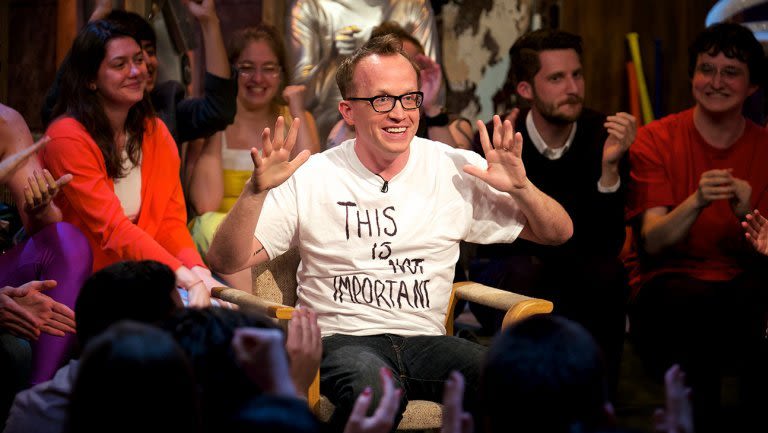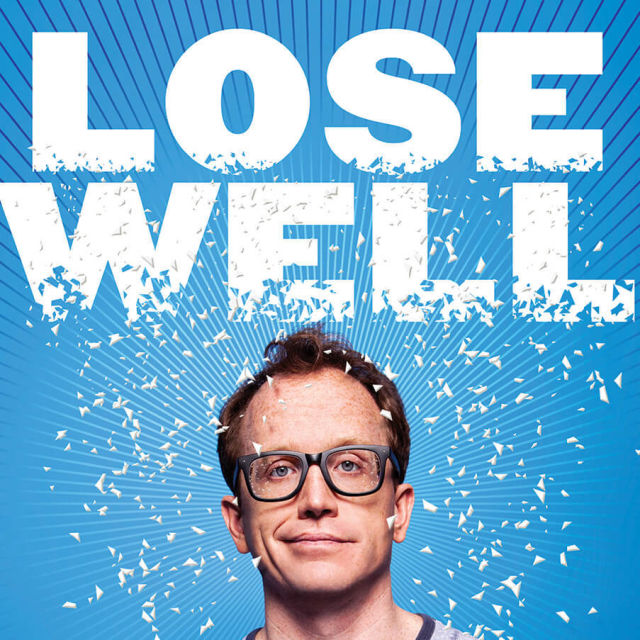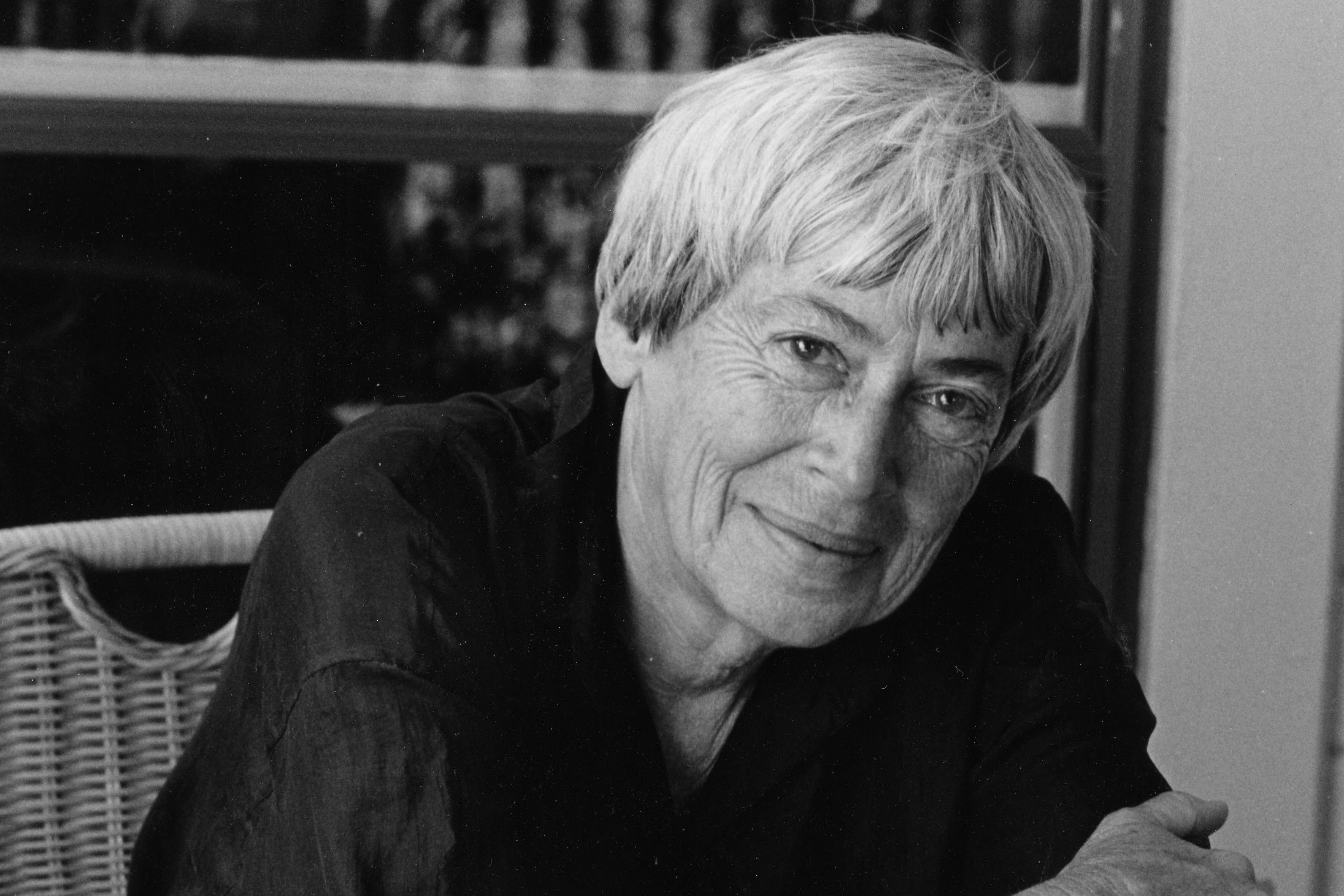Chris Gethard Explains Why Comedians Care About Portland

Chris Gethard on an episode of his talk show.
Image: Courtesy Chris Gethard
Chris Gethard is a guy who pops up everywhere. Whether it's as Ilana Glazer’s beleaguered boss on Broad City, as a struggling improv actor in Mike Birbiglia’s brilliant, SNL-esque sendup Don’t Think Twice, or—for hardcore lovers of The Office—as the guy Angela hired to bash in Oscar’s knees. Over the last decade, his wonderfully weird underground talk show also bounced from cable access to actual cable with unconventional episodes, like an entire show about the audience guessing what was in the dumpster (spoiler alert: Giamatti). Then there’s his stand-up hustle, with shows across the country and his own HBO special.
Now Gethard can add writing a book to his long list of wins. Titled Lose Well, it's half advice, half memoir, and dedicated to all the failing that is—inevitably—part of success. Gethard comes to Portland on Friday, October 26, doing double duty with a reading at Powell’s City of Books before a standup set at the Hawthorne Theatre. We chatted with him about the new project.

Image: Courtesy Chris Gethard
The idea of losing well is something I wish we'd teach all children from day one.
We make things a little too black and white and forget to tell people that there's a wide range of what success means.
What precipitated this book? Have you been working on it a long time?
The phrase “lose well” was something I said many years ago on my public access show. I just went on this rant about, you know, we're on public access and we’re the losers, but we're really good at losing. We lose well around here. That caught on with the fan base, and there's a whole bunch of people that have it tattooed on their body. It's really crazy. But the idea of writing a book was not on my mind.
Then how did it come together?
What ultimately precipitated the book was this girl I went to high school with reached out to me. In school, it was always like I was the funny guy and she was the funny girl. And she asked me a question that many people have asked me over the years: How did you make it happen? And one of the things that really frustrated me was that she had run into some real-life circumstances when we were young. I didn't have to deal with [that] and I found myself getting really pissed off that life made her feel like she couldn't ever take a chance on it again. It really lit a fire under me. As a comedian you get asked these questions all the time about how do you do it. So I decided Ito write a book with every single answer to that question in one place, every story from my past that I learned from, and every professional failure where I managed to get back up and dust myself off. I'm putting it all down in one place [for] the other people who are out there feeling frustrated and weighed down and confused about how to finally go for something,
It’s funny—I think we have a tendency to brush aside our stories. But when I read about an intensely embarrassing experience you had in junior high at a school dance, I see we all have those things from childhood that happened and formulated our coping skills for life. Does that make sense?
It absolutely does. And it was fun for me to lay out the premise for this book and the things I wanted to say. And then take a step back and go, well, I can look at an incident like that and realize that it actually was such a disaster, but man, it really did kind of teach me something.
It's an example a lot of people know that’s kind of a micro-version of what I'm saying with the book: where you ask somebody out and you get rejected and everybody finds out about it and they're laughing at you. You have two options at that point. You never ask someone out again, or you go, that was painful, but I was able to handle the pain. Next time I'm going to go out there and it's going to be a lot more casual and smooth and it all starts to work out. You start to learn. All of those crazy things from my past just felt like pain when they were happening. But somehow they added up into someone who is a C-minus level of celebrity.

Image: Courtesy Chris Gethard
Hey, at least C-plus! I'm curious about the writing process. How did writing a book compare to writing stand-up?
Writing a book is definitely the most challenging type of writing. When you’re writing stand-up, you can go up on a stage that night and see a reaction and have a pretty good idea of how it's going to play and what you need to fix. Whereas with this, it's more like lock yourself in a room and just tap into your own head and pour it all out there, and you have no idea if it's cooking in a positive way or if it's just total dreck. And to a comedian, that's a very unsettling feeling.
How is it performing comedy in Portland?
It's great. It's one of the cities where people are a little bit more willing to allow you to be philosophical. But they don't let you off the hook. In my home base of Brooklyn, where I do most of my shows, there are certain audiences where it's like as long as you're cool, you get away with it. I really like Portland because they want you to be artsy and they appreciate it, but also you better still be funny.
That’s interesting. So many comedians come through town, and I’m always curious what they think of us.
You’ve got New York, Los Angeles, and Chicago as far as the kind of cities the comedy industry comes out of. But Portland, I think, is the town where people who come to your shows have appreciation for art—[they’re] a smart crowd that gets it. I can speak for comedians when I say we give a shit about Portland.
Chris Gethard Book Reading
7:30 p.m. Fri, Oct 26, Powell's City of Books, FREE
Chris Gethard Stand-Up
10:30 p.m. Fri, Oct 26, Hawthorne Theatre, $25–40




